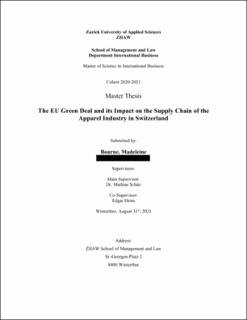Please use this identifier to cite or link to this item:
https://doi.org/10.21256/zhaw-24677| Publication type: | Master thesis |
| Title: | The EU Green Deal and its impact on the supply chain of the apparel industry in Switzerland |
| Authors: | Bourne, Madeleine |
| Advisors / Reviewers: | Schüz, Mathias Heim, Edgar |
| DOI: | 10.21256/zhaw-24677 |
| Extent: | 151 |
| Issue Date: | 2021 |
| Publisher / Ed. Institution: | ZHAW Zürcher Hochschule für Angewandte Wissenschaften |
| Publisher / Ed. Institution: | Winterthur |
| Language: | English |
| Subject (DDC): | 338: Production 363: Environmental and security problems |
| Abstract: | Excessive greenhouse emissions produced by humankind have led to global warming, making 2020 the hottest year on global record, leading to major consequences for humans and the environment. With the EUGD, the EU aims to firstly turn Europe into a society that works resource-efficiently, secondly, serve as a competitive environment that by 2050 counts no net emissions of greenhouse gases, and thirdly, create an economic evolution that is disconnected from the usage of resources. Its overarching goal is to become the first climateneutral continent by 2050. As the textile industry was declared the 4th most polluting industry with an almost linear production due to the rise of fast fashion, the sector must change its strategy. As a highly resource-intensive industry, the EU selected it to be a focus sector with its own industrial strategy. Hence, this thesis aimed to find out how Swiss apparel brands will be affected by the EUGD due to production sites in Europe and Switzerland's central location in Europe. The focus was the impact on their supply chain due to stricter measures and inevitable changes in business model, their competitiveness, and recommendations for an efficient and effective supply chain. To ascertain the impacts of the EUGD, a qualitative approach was chosen. Seven semistructured interviews with four brands and three industry experts were conducted for the primary data collection. The questions posed were based on the EUGD framework and existing literature on supply chains and corporate responsibility and varied depending on stakeholder group. The answers were then evaluated with the help of two qualitative coding cycles, which allowed for categories and patterns to be drawn. The results showed that all areas of the supply chain are affected and very tightly linked to the whole value chain. In the future, all garments must be designed for longevity and recyclability, and the number of suppliers must be reduced to increase control and transparency beyond Tier 1. Certifications on production sites and products increase traceability and information for the consumer. Logistics are still tied to trucks; nevertheless, more sustainable inputs and transportation will significantly increase costs. Finally, circular business models are not seen to increase a brand's competitiveness because the customer is believed not to be ready yet. Brands today are responsible for their actions and those of their suppliers and consumers. Therefore, Swiss apparel brands are just as subject to the EUGD. The environment will become the heart of the supply chain, so new companies should increasingly target younger customers. From the beginning off, either the cycles (biodegradable or technical) should be chosen. Product-as-a-Service will eventually become the new normal, which is why a focus should be laid on a reverse supply chain process. Most importantly, however, the consumer's awareness must be raised before changes in the supply chain can be made. |
| URI: | https://digitalcollection.zhaw.ch/handle/11475/24677 |
| License (according to publishing contract): | CC BY-NC-ND 4.0: Attribution - Non commercial - No derivatives 4.0 International |
| Departement: | School of Management and Law |
| Appears in collections: | MSc International Business |
Files in This Item:
| File | Description | Size | Format | |
|---|---|---|---|---|
| Master Thesis_Madeleine Bourne.pdf | 1.51 MB | Adobe PDF |  View/Open |
Show full item record
Bourne, M. (2021). The EU Green Deal and its impact on the supply chain of the apparel industry in Switzerland [Master’s thesis, ZHAW Zürcher Hochschule für Angewandte Wissenschaften]. https://doi.org/10.21256/zhaw-24677
Bourne, M. (2021) The EU Green Deal and its impact on the supply chain of the apparel industry in Switzerland. Master’s thesis. ZHAW Zürcher Hochschule für Angewandte Wissenschaften. Available at: https://doi.org/10.21256/zhaw-24677.
M. Bourne, “The EU Green Deal and its impact on the supply chain of the apparel industry in Switzerland,” Master’s thesis, ZHAW Zürcher Hochschule für Angewandte Wissenschaften, Winterthur, 2021. doi: 10.21256/zhaw-24677.
BOURNE, Madeleine, 2021. The EU Green Deal and its impact on the supply chain of the apparel industry in Switzerland. Master’s thesis. Winterthur: ZHAW Zürcher Hochschule für Angewandte Wissenschaften
Bourne, Madeleine. 2021. “The EU Green Deal and Its Impact on the Supply Chain of the Apparel Industry in Switzerland.” Master’s thesis, Winterthur: ZHAW Zürcher Hochschule für Angewandte Wissenschaften. https://doi.org/10.21256/zhaw-24677.
Bourne, Madeleine. The EU Green Deal and Its Impact on the Supply Chain of the Apparel Industry in Switzerland. ZHAW Zürcher Hochschule für Angewandte Wissenschaften, 2021, https://doi.org/10.21256/zhaw-24677.
Items in DSpace are protected by copyright, with all rights reserved, unless otherwise indicated.